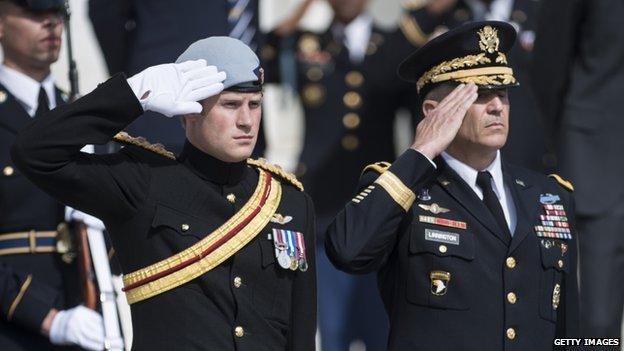Who, What, Why: Why does the military insist on saluting?
- Published

The UK's Ministry of Defence has issued a reminder to young officers to salute their superiors. But when did this form of greeting originate and why is it used, asks Justin Parkinson.
The salute is often thought to date back to Roman times, but there is no evidence, external that soldiers raised their hand as a formal greeting.
Another theory is that it originated in medieval Europe, when knights used their hands to raise their visors, external, revealing their identity to demonstrate they were friendly. This explanation is also regarded with scepticism, external.
It later became British Army tradition for privates and non-commissioned officers to remove their hat to greet officers. Junior officers did the same to their seniors. This apparently ended in the 18th Century because of concerns over excessive wear to headgear or hats becoming more cumbersome. A 1745 British order book, external states: "The men are ordered not to pull off their hats when they pass an officer, or to speak to them, but only to clap up their hands to their hats and bow as they pass."
The British Army developed a salute with the palm facing outwards, also used by the Royal Air Force. The Royal Navy, however, adopted a version with the palm facing downwards, thought to be because many men working on ships had dirty palms, external and to display them was disrespectful.
The salute works both as a mark of recognition for the Queen's commission awarded to officers and for seniority of rank, says Simon Lamb, of the British Veterans Recognition Card, external group. It is important that the senior person returns the salute to acknowledge the respect accorded, he argues.
The Royal Navy's form of salute is thought to have influenced the US military, external, whose version also involves the palm facing downwards.
Etiquette is important. In September last year, US President Barack Obama was criticised for saluting a marine as he left a helicopter while continuing to hold a cup of coffee, external. "It has been said that a sloppy salute is worse than not saluting at all," says the US Coast Guard Auxiliary, external, which, like many other non-military organisations, also salutes.
With the UK military becoming increasingly engaged in operations involving two or more of the armed forces, junior officers are said to have become confused over differing ranks and when to salute. So the UK Ministry of Defence has issued a chart explaining rankings and the insignia worn, external.
"In one's own service the pecking order will be pretty well understood - after all, it is drummed into you from day one of basic training," it says, adding that "protocol might not be so obvious" when services work together.
Subscribe to the BBC News Magazine's email newsletter to get articles sent to your inbox